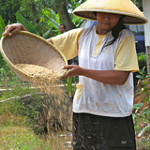IFPRI’s partnership with Australia traces back to its inception when it was fortunate to have a world-renowned Australian economist Sir John Crawford as its first board chairman.
Plausible Futures for Economic Development and Structural Adjustment – Impacts and Policy Implications for Indonesia and Australia
IFPRI reviewed the role of agricultural sectors in rural development and the overall economy and identified policies that can impact positively upon incomes, poverty and hunger in the longer-term
Priorities for Public Investment in Chinese Agriculture
Where should a country invest its money? How policymakers answer this complex question can have an impact on the welfare of their constituents—especially those living in poverty—for generations.
HarvestChoice: Targeting and Evaluating Sustainable Intensification Investments
MOTIVATION Where do poor people live? How do they live? On what farming systems do the poor depend most? And what is constraining the productivity of those systems? To answer these questions and many others, HarvestChoice generates maps, datasets, economic models, and other knowledge products. By providing data specific not only to a continent or country >> Read more
Exploring Alternative Futures for Agricultural Knowledge, Science, and Technology
MOTIVATION Agricultural innovations can transform societies. Extending agricultural productivity improvements to poor farmers could narrow the gap between the developed and developing worlds. Experts agree that agricultural knowledge, science, and technology have played a crucial role in reducing hunger and poverty in the past. The future, however, is uncertain because the impacts of alternative technologies >> Read more
Markets for High-Value Commodities in Indonesia
Promoting Competitiveness and Inclusiveness Motivation Rapid economic growth in Indonesia has led to a rising demand for food quality and food safety, as well as the growth of supermarkets. Will smallholders benefit from supplying these growing markets, or will they be marginalized by their inability to meet the quality and quantity requirements of large-scale retailers? >> Read more




